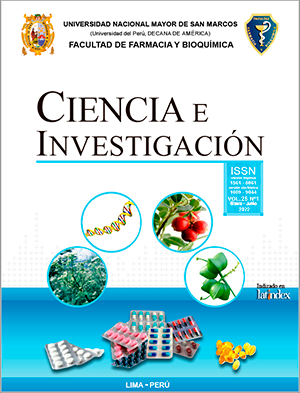Determinación de metales pesados en tomate (Solanum lycopersicum) y su riesgo para la salud humana
DOI:
https://doi.org/10.15381/ci.v25i1.23470Palabras clave:
Metales pesados, contaminación en alimentos, Solanum lycopersicum, evaluación de riesgos a la saludResumen
Los metales pesados generan efectos adversos en la salud a diferentes niveles, incluyendo, para algunos metales, el efecto cancerígeno, es por ello que la presencia de estas sustancias en alimentos para muchos países como el Perú, es considerado un problema de salud pública. La investigación tuvo como objetivo evaluar el riesgo a la salud asociado al consumo de tomate (Solanum lycopersicum) con presencia de metales pesados como arsénico y plomo en Lima metropolitana. Se tomaron 30 muestras de tomate de los principales lugares de abastecimiento de Lima metropolitana y se determinó la región de procedencia. Las muestras fueron analizadas por espectrofotometría de absorción atómica en el Centro de Información, Control Toxicológico y Apoyo a la Gestión Ambiental – CICOTOX. La concentración media de arsénico en tomate fue 0,1908mg/Kg; este nivel superó el estándar definido por el Mercosur (0,1mg/Kg). Asimismo, la concentración media de plomo fue 0,0876mg/Kg; este valor superó el estándar definido por el Codex Alimentarius (0,05mg/Kg). Finalmente, se estimó el riesgo humano (HR) por ingesta de tomate por la metodología propuesta por OMS/OPS. Se determinó que el riesgo por consumo de tomate no representa un riesgo significativo para la salud humana.
Descargas
Publicado
Número
Sección
Licencia
Derechos de autor 2022 José Castillo, Juleisi Domínguez, Mesías García, Gloria Marín, Denisse Olórtegui, Christopher Ynocente

Esta obra está bajo una licencia internacional Creative Commons Atribución 4.0.
LOS AUTORES RETIENEN SUS DERECHOS:
- Los autores retienen sus derechos de marca y patente, y tambien sobre cualquier proceso o procedimiento descrito en el artículo.
- Los autores retienen el derecho de compartir, copiar, distribuir, ejecutar y comunicar públicamente el articulo publicado en la Revista Ciencia e Investigación (por ejemplo, colocarlo en un repositorio institucional o publicarlo en un libro), con un reconocimiento de su publicación inicial en la Revista Ciencia e Investigación.
- Los autores retienen el derecho a hacer una posterior publicación de su trabajo, de utilizar el artículo o cualquier parte de aquel (por ejemplo: una compilación de sus trabajos, notas para conferencias, tesis, o para un libro), siempre que indiquen la fuente de publicación (autores del trabajo, revista, volumen, numero y fecha).






